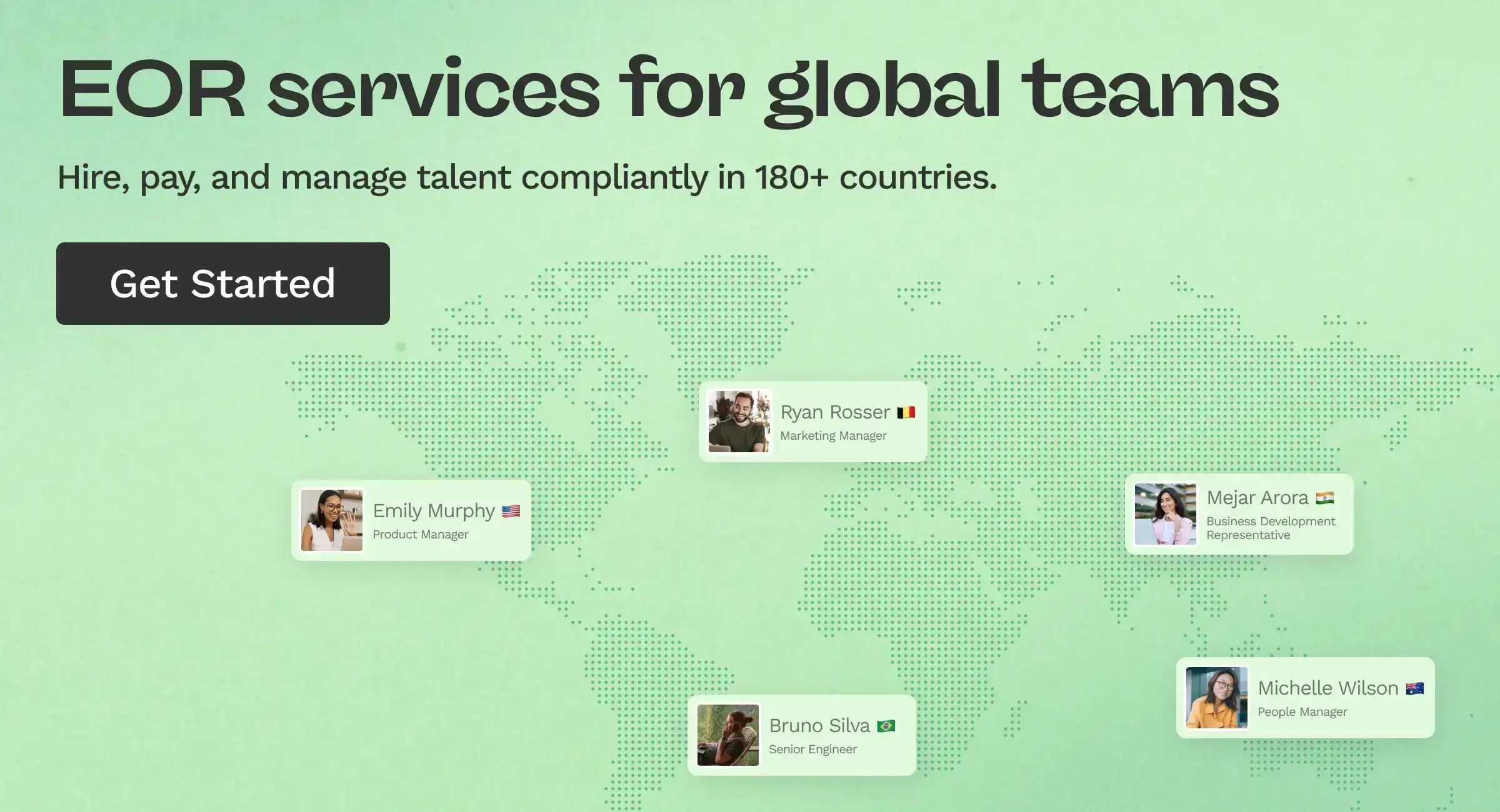The Philippines has a thriving remote work culture. Professionals across many industries—including software developers, executive assistants, and customer service professionals—support employers around the globe.
If you haven’t hired candidates from the Philippines before, you might be worried about potential issues, such as onboarding or payroll errors. And those are valid concerns. Companies that make these mistakes can face serious legal action.
Read on to learn essential labor laws in the Philippines. We’ll show you key steps to properly classify employment types, manage compensation, and stay compliant so you can confidently hire global employees.
6 types of employment contracts in the Philippines
Employers hiring workers from the Philippines need to understand the country’s employment types. Potential misclassifications can spur a chain of hiring and payroll errors. In the Labor Code of the Philippines, the Department of Labor and Employment (DOLE) outlines the following six key employment categories.
1. Probationary employment
Probationary employment is the precursor to regular employment. It’s a trial period in which new hires must prove themselves over a period of six months, or 180 days, before securing a permanent role. After 180 days, the employer must terminate or convert the role to regular employment.
2. Regular employment
This classification means a company indefinitely hires an individual to work certain hours on a fixed schedule. Full-time employees working in the regular employment model receive benefits like insurance and leave. And employers must contribute to the country’s universal healthcare system.
Government employment operates outside of the Labor Code of the Philippines, adhering instead to Civil Service laws. These regulations aim to keep government work ethical, preventing corruption and nepotism.
3. Project-based employment
Project-based employment is a contract role, most common for remote workers. In this model, an independent contractor agrees to perform a certain scope of work. Once the project ends, the contract terminates.
4. Fixed-term employment
This is another type of contract work suitable for short-term remote hires. It allows employers to hire workers for a specific duration. The contract must clearly state the start and end dates, and the role must not be essential to the company’s regular operations.
5. Seasonal employment
Seasonal employment refers to temporary work at certain times of the year. Companies hire seasonal employees during peak periods when workloads increase. For example, a hotel that receives an influx of guests during their high season will hire workers to help get them through that period.
6. Casual employment
Casual employment is a flexible work arrangement. It’s used for employment that is occasional or not essential to the business. Employers may call in employees as needed, without guaranteeing future engagement.
Employment terms in the Philippines
Knowing how to correctly classify an employee is only the start. There are still several other Philippine labor laws that employers must know. The following terms ensure benefits and salary protections.
Working hours and overtime pay
The Philippine work week is typically 40 hours, running from Monday to Friday. Each workday is usually eight hours or less. Employers must pay overtime at 25% to people who work more than eight hours per day.
Employees may work up to six days, totaling 48 hours weekly. But if they do work on a rest day, they’re entitled to overtime pay of 30% more for those hours.
Rest days, breaks, and paid holidays
All employees receive at least one rest day per week. Shifts longer than five hours require a one-hour break.
Republic Act 9492 requires employees to receive 11 paid regular holidays and three unpaid special national ones. Employees working on regular holidays earn double their normal wages, and 30% more on special holidays.
Wage and minimum wage structure
Minimum wage rates in the Philippines vary by region. They’re set by regional wage boards. Employers who fail to meet the minimum wage threshold could face penalties and labor disputes.
Night shift differential
Employees working from 10 p.m. to 6 a.m.—or any schedule even partially in this range—are eligible for additional pay. This night shift differential adds 10% to their regular wage. Employees who work this time of day are still eligible for overtime pay on shifts over eight hours.
Service incentive, parental, and maternity leave entitlements
Employees earn five days of service incentive leave (SIL) after one year of tenure. But many companies give more as part of a competitive compensation package.
This is a helpful perk, especially because the Philippines’ labor code doesn’t mandate sick leave. There are, however, paid provisions for paternity and maternity leave. Most mothers receive 105 days, but single ones get 120. There’s also an option to take an additional 30 days of maternity leave, but it’s unpaid. Fathers receive seven days of paternity leave.
Single parents can claim seven additional days of leave per year. To qualify, they must register with the Department of Social Welfare and Development (DSWD) as a sole caretaker.
13th-month pay requirements
Companies must pay a holiday bonus of a month’s salary before December 24th—Christmas Eve. This is known as 13th-month pay. Only employees who have been with a company for the whole year receive the full amount. New hires get a prorated amount based on tenure.
Health and safety standards
In addition to meeting benefits requirements, companies must register with DOLE and follow occupational health and safety laws. These ensure safe working conditions for workers. Here are the most common rules all HR departments should understand:
- Hazard-free workplace: Companies must ensure that working areas are safe and employees have access to adequate personal protective equipment when using chemicals or other potentially dangerous tools and substances.
- Risk education: Employees must be trained on possible job hazards. Depending on the nature of the work and size of the company, employers may need a certain number of safety consultants.
- Emergency response training: Employers should create and share emergency response plans for hazards like fires or spills.
Termination and employee protections
The Philippines doesn’t have at-will employment, meaning companies can’t fire a worker for any reason at any time. Employees enjoy a high level of protection, and employers must consider the following before terminating an employee:
- Just cause: Employers can only fire employees for serious infractions, such as misconduct, negligence, or criminal activity. The company must provide two notices before proceeding with termination.
- Authorized cause: Companies that are facing financial problems or closure may terminate employees with severance. Organizations can also terminate seriously ill employees if they become too sick to perform work or put their coworkers at risk.
How to stay compliant with the Philippine labor laws
The Philippines boasts a strong culture of worker protections and collective bargaining. Employers must stay informed and act responsibly to avoid penalties. The following are important compliance issues for all companies that employ workers from the Philippines:
- Monitor DOLE regulations: DOLE employee rights change often. Whether it’s re-establishing the minimum wage or updating holiday leave, you can avoid an omission by staying up-to-date on the latest revisions.
- Avoid misclassification: Remote workers and employees have different rights. Review the full guidelines on how to classify different types of workers according to Philippine law. Working with a global employer of record (EOR) like Oyster prevents you from making costly mistakes.
- Consult experts: Given the strict guidelines around terminating an employee, it’s best to work with a local legal expert or international hiring partner on any offboarding process. This can help companies avoid wrongful terminations.
Hire compliantly in the Philippines with Oyster
Before you extend a contract to a perfect hire in the Philippines, you’ll need to do your due diligence. Hiring Filipino workers requires knowledge of labor laws, wage rules, and employment contracts. For a smoother process, leave it to the experts.
Oyster’s EOR services take the headache out of hiring global talent, with compliant onboarding, payroll, and benefits in over 180 countries. Let Oyster manage the legal details so you can focus on building strong relations and a productive team.

About Oyster
Oyster is a global employment platform designed to enable visionary HR leaders to find, engage, pay, manage, develop, and take care of a thriving distributed workforce. Oyster lets growing companies give valued international team members the experience they deserve, without the usual headaches and expense.
Oyster enables hiring anywhere in the world—with reliable, compliant payroll, and great local benefits and perks.








